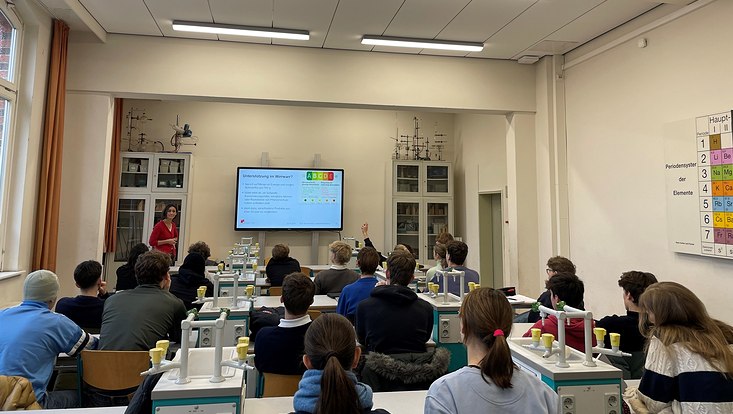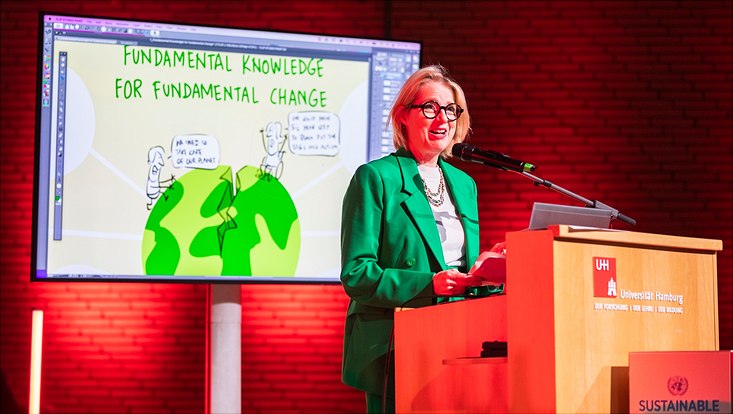Wir wollen’s wissen!The University Visits Hamburg’s Schools
6 February 2024, by Linda Lämke

Photo: Universität Hamburg
Be it in physics or philosophy, researchers from Universität Hamburg, DESY, and the University Medical Center Hamburg-Eppendorf will be swapping the lecture halls for the classroom to give insight into their work as part of Wir wollen’s wissen! (We want to know!).
At 12 noon on the dot, the double lesson begins for the upper secondary school students at Gymnasium Blankenese. But on this particular Monday in January 2024, the normal chemistry lesson isn’t taking place. That’s because Prof. Dr. Maria Buchweitz from the Department of Chemistry at Universität Hamburg will be taking the class rather than their regular teacher, Saskia Ludewig.
The food chemist’s lesson is one of 75 lectures being offered as part of Wir wollen’s wissen! (We want to know!). The format is financed through the Excellence Initiative of the Federal and State Governments and is one of various measures aimed at opening up Universität Hamburg to the community. As part of this, researchers from various faculties at Universität Hamburg, DESY, and the University Medical Center Hamburg-Eppendorf visit classrooms to give around 2,000 Hamburg school students insights into the University, studying, and research.
Food scandals and Nutri-Score
During her visit, Maria Buchweitz delivers a lecture titled “Lass Nahrung deine Medizin sein und Medizin deine Nahrung” (Let food be your medicine and medicine be your food) to 24 students. She uses various food scandals to give an impression of her work. Buchweitz also explains that it isn’t always so easy to answer the question of what is healthy and that food chemistry and nutritional science must come together.
She explains this using the example of the Nutri-Score, which plays an increasingly important role in the nutritional rating of food. The Nutri-Score uses the letters A–E and appears as a color nutrition label on food packaging. Buchweitz explains that “One must understand that the Nutri-Score can be used only to compare foods from one category, as it is calculated on a 100-gram basis due to specific nutrients and ingredients.” Thus, according to Prof. Buchweitz, the scale can be particularly helpful when selecting convenience foods. However, the scale serves only to orientate, as “complex relationships can be simplified only to a limited extent.”
Offerings for various class levels
For around 90 minutes, Prof. Buchweitz talks about her research and takes questions from the upper secondary school students. They want to know, for example, whether meat substitutes are actually healthy and what her opinion is on protein powder. The special double lesson comes to an end for the students at 1:30 pm, but Prof. Buchweitz will give another lecture the following day at Gymnasium Rissen and, 2 days later, at Gymnasium Blankenese again–this time to eighth graders. A special feature of the format is that it is aimed primarily at higher grades but also has offerings for younger students.
“Wir wollen’s wissen! is an excellent format to show young people where a degree—and in my case, particularly a chemistry degree—can lead. With my lecture, I want to show the role of science and scholarship in the context of food and generate enthusiasm for my discipline among students,” says Prof. Buchweitz.
In the coming year, Wir wollen’s wissen! will take place in Hamburg’s schools once again. More information will follow in fall 2024.


